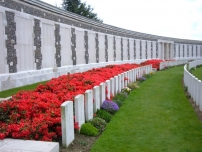| First Name: | William | Last Name: | BIRD | |
|---|---|---|---|---|
| Date of Death: | 13/10/1917 | Lived/Born In: | Euston | |
| Rank: | Rifleman | Unit: | King's Royal Rifle Corps8 | |
| Memorial Site: | Tyne Cot Memorial, Belgium | |||
Current Information:Age-20 Born-St Pancras
Third Battle of Ypres This was a campaign fought between July and November 1917 and is often referred to as the Battle of Passchendaele, a village to the north-east of Ypres which was finally captured in November. It was an attempt by the British to break out of the Ypres salient and capture the higher ground to the south and the east from which the enemy had been able to dominate the salient. It began well but two important factors weighed against them. First was the weather. The summer of 1917 turned out to be one of the the wettest on record and soon the battlefield was reduced to a morass of mud which made progress very difficult, if not impossible in places. The second was the defensive arrangements of concrete blockhouses and machine gun posts providing inter-locking fire that the Germans had constructed and which were extremely difficult and costly to counter. For 4 months this epic struggle continued by the end of which the salient had been greatly expanded in size but the vital break out had not been achieved. On 10-11th October, 1917, 14th Division relieved 5th Division between the Menin road and Polygon Wood. In anticipation of this 8th King’s Royal Rifle Corps of 41 Brigade, moved on 10th October to Bedford House and that evening took over the line 600 yards east of Inverness Copse near Polderhoek. The following day, the next British offensive in the long struggle known as 3rd Ypres took place with the First Battle of Passchendaele. Although all the fighting during Third Ypres is often referred to as the Battle of Passchendaele, that name officially belongs to two battles fought late in the campaign. The first of these was fought on 12th October, 1917 when Australian and New Zealand troops of Second Army attacked the Passchendaele ridge, capture of which would have given them sight of the important railway junction at Roulers, a vital part of the German supply network. Although 14th Division were not part of this offensive, their position in the line, further south in the salient, meant that they too had to contend with the increased artillery fire that the battle engendered. On 12th October, 8th King’s Royal Rifle Corps sent two platoons to positions north of the Menin Road and another two platoons north of Inverness Copse. They remained here until relieved on 16th October, all the time under constant and at times fierce shell fire. Not surprisingly the casualties mounted up. One of these was William Bird who was killed on 13th October. |
||||
| « Back to Search Results | ||||
| If you think any of the information shown here is incorrect, Click Here to submit your amends and comments | ||||




